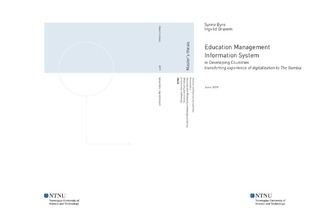| dc.contributor.advisor | Monteiro, Eric | |
| dc.contributor.author | Byre, Synne | |
| dc.contributor.author | Gravem, Ingvild | |
| dc.date.accessioned | 2019-11-20T15:00:17Z | |
| dc.date.available | 2019-11-20T15:00:17Z | |
| dc.date.issued | 2019 | |
| dc.identifier.uri | http://hdl.handle.net/11250/2629587 | |
| dc.description.abstract | Det blir stadig viktigere å identifisere effektive og målrettede fokusområder for å adressere det digitale gapet og redusere skillet mot utviklingsland. Avhandlingen har som mål å bygge på kompetansen som omfatter en betydelig del av informasjonssystemer. Ved å fokusere på implementeringen av et digitalt system, undersøker vi mulighetene for å ta i bruk District Health Information System 2 i utdanningsdomenet for å møte utviklingskrav. DHIS2 sin lange fartstid og erfaring fra helsesektoren har en betydelig overføringsverdi. Men for å sikre bærekraftig digitalisering, må hensyn til potensielle lokale utfordringer tas. Betydningen rundt en tilfredsstillende systemer, understreker viktigheten av å anerkjenne og angripe fremtidige utfordringer, for å unngå mangelfull implementering.
Forskningen består av en casestudie på et tidlig stadium i implementeringen av et digitalisert Education Management Information System i Gambia. Et fire-ukers feltarbeid utgjør datainnsamlingen, som skjedde i nært samarbeid med utdanningsministeriet i Gambia, samt et implementeringsteam fra HISP West \& Central Africa. Avhandlingen har videre undersøkt hvordan en distribuert arbeidsbelastning vil påvirke både utførelsen av systemet og datainnsamlingen. Det ble besøkt skoler, og avholdt intervjuer med lærere med fokus på deres arbeidshverdag og holdninger til et digitalisert system.
Studien viser at det er en utbredt optimisme for å digitalisere, med store forventninger for suksess. Til tross for at en betydelig mengde av IT prosjekter gjennom historien mislykkes, anerkjennes det at overføringsverdien mellom domenene kan bistå til en vellykket implementering. Det vil likevel kreve en grundig forståelse rundt anvendelsen av teknologi, folk og domenet. Implementeringen er fortsatt i en tidlig fase, som tilsier lite grunnlag i å kunne forutsi verken prosjektets suksess eller fiasko. Likevel kan faktorer rundt miljø og infrastruktur i Gambia utsette en nasjonal implementering. Det er imidlertid flere lærdommer å hente for fremtidige prosjekter, som trekker seg utover kontekstenes nyanser med tanke på både suksessfaktorer og fallgruver i relasjon til alle byggeklossene som omfatter digitale system. | |
| dc.description.abstract | It is becoming increasingly important to identify effective and targeted focus areas for development, to address the digital divide and ultimately decrease the gap between developed and developing countries. This thesis aims to further build on the knowledge that comprises a significant part of the nature of information systems. By focusing on the implementation of a digital system, it explores the prospect of using District Health Information System 2 in the domain of education to meet development demands. DHIS2's long-established existence and experience from the health sector have significant potential and transfer-value. However, the importance of a satisfactory system emphasizes the importance of recognizing and addressing future challenges in order to avoid deficient implementation.
The study's philosophical foundation and research approach consist of an interpretive case study at an early stage in the implementation of a digitalized Education Management Information System in The Gambia. A four-week fieldwork constitutes the empirical data collection, in close collaboration with the Ministry of Basic and Secondary Education, and an implementation team from HISP West \& Central Africa. The thesis has further explored how a distributed workload affects both the completion of the system and the data collection. Schools were visited, and interviews of teachers were conducted to focus on daily workloads, workflows, and attitudes towards a digitalized system.
The study shows a widespread optimism and great anticipation towards a new system and its success. Despite the significant amount of failures throughout the history of IT projects, acknowledges the thesis how transfer-value between the domains may ensure successful implementations. It will nevertheless require a thorough understanding of the application of technology, users, and the domain. The implementation of EMIS is still at an early stage, which indicates little grounding for predicting neither the project's success nor failure. Nevertheless, environmental and infrastructural factors in The Gambia may postpone a national implementation. However, there are several lessons to be learned for future projects to extract beyond the nuances of the contexts in terms of both success factors and pitfalls concerning all the building blocks encircling information systems. | |
| dc.language | eng | |
| dc.publisher | NTNU | |
| dc.title | Education Management Information System in Developing Countries: Transferring experience of digitalization to The Gambia | |
| dc.type | Master thesis | |
